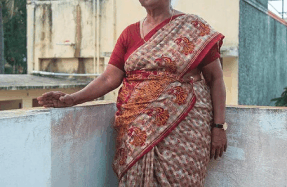
LAKSHMIBAI RIDES A HORSE into the compound of a bungalow housing officers of the East India Company, wearing a heavily embroidered green sari. “You cannot come inside without permission,” one officer tells her. “Didn’t you see the board?” “Bloody Indians,” another officer exclaims, while a third asks,“Can’t you read English?” The queen consort of the princely state of Jhansi dismounts and walks up to the visibly smug officers. “I can read English,” she says. “It’s a mere language. Just words. Words without culture have no meaning.”
This is a scene from the 2019 film Manikarnika: The Queen of Jhansi, starring, and co-directed by, Kangana Ranaut. Lakshmibai was a prominent figure in the 1857 uprising against the British and is often presented as a nationalist symbol of strength and resistance. The film’s politics are crystal clear: the British epitomise evil, while benevolent Indian royals are the sole defenders of poor village folk against the cruelty of foreign invaders.
Lakshmibai is furious with the officers because they are about to eat steak, cooked from a calf they have snatched from a farmer. “The earth you stand on, learn to respect its people and their feelings,” she tells them. “Our mother tongue is akin to our mother. And there can be just one.” She throws a sword at a shed caging cows and goats to free them. “From now on, all cattle and goats are the personal property of the king,” she decrees. “They have been lent to the people for rearing. The Company cannot touch them.” The officers accept this without protest. “Your Majesty,” one of them says.
In a scene that lasts barely two minutes, Ranaut and her crew demonstrate their affinity with causes espoused by the ruling Bharatiya Janata Party and its parent organisation, the Rastriya Swayamsevak Sangh. This includes reverence of the cow, the imposition of Hindi as India’s national language and the promotion of revisionist history that can be put in the service of the RSS’s goal of a Hindu Rashtra.
Manikarnika and Ranaut are one in their ideological position. In a recent promotional event for her film Dhaakad, which was released on 20 May, Ranaut spoke about the ongoing language debate. “No matter how dark the colonial history is, fortunately or unfortunately, English has become that link” of communication, she said. “Should that be the link? If you ask my opinion, I think that national language should be Sanskrit, because Kannada, Tamil, Gujarati, Hindi have all originated from it.” When people of Tamil Nadu and Bengal reject Hindi as the national language, she added, they are “denying Delhi being the centre of the government.”
The hyper-nationalist themes of Ranaut’s films are a recent phenomenon, and, over the years, her own public expressions of nationalism have become exponentially venomous. In May 2021, the Trinamool Congress swept the assembly election in West Bengal. The BJP had fought a high-decibel campaign. Right after the verdict, BJP leaders such as Swapan Dasgupta promoted a communal narrative that claimed Hindu families who supported the BJP were being specifically targeted by the TMC. “We need super gundai”—thuggery—“to kill gundai,” Ranaut tweeted, suggesting that the state’s chief minister, Mamata Banerjee, was “like an unleashed monster, to tame her Modi ji please show your Virat roop from the early 2000s.”
To most people on social media, this was immediately recognised as a thinly-veiled reference to the anti-Muslim pogroms that took place in 2002, during Narendra Modi’s tenure as chief minister of Gujarat. “Virat roop” refers to the majestic form taken by the Hindu god Krishna during the battle of Kurukshetra in the Mahabharata. Modi distanced himself from the events of 2002 as he rose to power in Delhi and is studiously building an image as the irreproachable patriarch of a great civilisation. Ranaut’s tweet may have been a blot in the process. Following the tweet, Twitter permanently suspended Ranaut’s account for her frequent violation of its policies.
During Modi’s tenure as prime minister, there has been an increase in production of propaganda films, such as Uri: The Surgical Strike and The Kashmir Files. Several members of Bollywood have been co-opted into the Hindu nationalist agenda and have openly voiced their support for the regime. Among them, however, Ranaut has stood out as Modi’s most strident supporter—which is only one of her most recent avatars.
Ranaut was once celebrated by the media as a feminist icon. Her journey as a self-made star and her sharp criticism of a male-dominated film industry delighted liberals. Over the years, she has spoken extensively about being an outsider in the film industry, to emphasise that she does not have the advantages enjoyed by her contemporaries from well established film families. Her frankness in interviews was seen as refreshing compared to other actors who tend to remain tight-lipped about their profession. She was also one of the first to speak about the gendered pay gap in the Hindi film industry.

In February 2017, Ranaut appeared on the producer and director Karan Johar’s popular talk show Koffee with Karan, with the actor Saif Ali Khan. The show is popular for how Johar is able to teasingly prod celebrities for gossip, most of whom he shares an easy familiarity with. Johar is responsible for launching several acting careers—most notably those of the children of star actors—and is considered one of Bollywood’s most prominent gatekeepers of Bollywood celebrityhood.
The episode created headlines. Ranaut spoke calmly about how Johar had belittled her for most of her career. “If it wasn’t for all the rejections and mocking, I wouldn’t have made it,” she said. She called Johar the “flag-bearer of nepotism” in the film industry and said that if she ever made a biopic, he would




